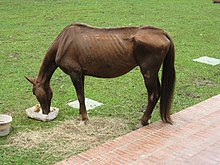This article has multiple issues. Please help improve it or discuss these issues on the talk page. (Learn how and when to remove these messages)
|

Horse welfare or equine welfare helps describe the acceptable conditions of life and use for domesticated horses, in contrast to suffering produced by voluntary or involuntary actions of others, whether through physical abuse, mutilation, neglect, transport, vivisection or other forms of ill treatment. Debates about the welfare and abuse of horses are recent. In the nineteenth century, when the sight of a horse dying while working was commonplace, the first wave of awareness was born with the Society for the Prevention of Cruelty to Animals and the publication of the novel Black Beauty in England. France followed suit with the creation of the French League for the Protection of the Horse and the passage of the Grammont Law in 1850. Similar concerns over animal welfare developed in the United States. The debate intensified and extended throughout North America and Europe over the next century, particularly regarding the use of the horse during war, the use of horses as working animals on city streets, sports training, horse slaughter, and conditions of horse breeding and keeping. In the United States, the practice of soring resulted in the passage of the Horse Protection Act of 1970 and various organizations protested against abuses in horse racing and rodeo. In the early twenty-first century, these issues remained in the public eye and new controversies arose, especially about training methods such as Rollkur, problems in the field of endurance riding, stable confinement, and the presence of carriage horses in modern cities such as New York City.
The definition of "well-being" is complex as regards the horse. Horses are very quiet and show few signs of discomfort, which makes the detection of pain particularly difficult. Theorists in the Western world once went so far as to consider the horse as incapable of feeling pain. The horse is also a sociable creature, designed by evolution to spend most of it time grazing in a natural setting. Horses develop stereotypic behaviors and other problems when kept in isolation, unable to graze, or if subjected to prolonged confinement in a stable.
The International Federation for Equestrian Sports (FEI) now prohibits certain specific training methods, including poling and Rollkur, as have several countries, notably Switzerland. Many nations have passed assorted laws to protect horses from practices that include tail docking, transportation for excessive lengths of time, and artificial aids in horse racing or other equestrian competitions are subject to bans or national or European limitations. Transportation to slaughterhouses is regulated. In the context of increased research on equine welfare, new practices such as natural horsemanship, barefoot hoof care, and even refusal of riding have developed. These suggest a major concern for the welfare of the horse will continue into the future.